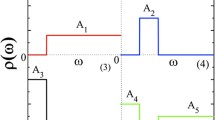Abstract
We establish that a mode-coupling approximation for the dynamics of multi-component systems obeying Smoluchowski dynamics preserves a subtle yet fundamental property: the partial density correlation functions are, considered as matrices, completely monotone, i.e., they can exactly be written as superpositions of decaying exponentials only. This statement holds, no matter what further approximations are needed to calculate the theory's coupling parameters. The long-time limit of these functions fulfills a maximum property, and an iteration scheme for its numerical determination is given. We also show the existence of a unique solution to the equations of motion for which power series both for short times and small frequencies exist, the latter except at special points where ergodic-to-nonergodic transitions occur. These transitions are bifurcations that are proven to be of the cuspoid family.
Similar content being viewed by others
REFERENCES
W. Götze and L. Sjögren, J. Math. Anal. Appl. 195:230-250 (1995).
S. R. Williams and W. van Megen, Phys. Rev. E 64:041502 (2001).
W. Götze, J. Phys.: Condens. Matter 11:A1-A45 (1999).
G. Nägele, Phys. Rep. 272:215-372 (1996).
G. Gripenberg, S. O. Londen, and O. Staffans, Volterra Integral and Functional Equations, in Encyclopedia of Mathematics and Its Applications, Vol. 34 (Cambridge University Press, Cambridge, 1990).
D. V. Widder, The Laplace Transform (Princeton University Press, Princeton, 1946).
J.-P. Boon and S. Yip, Molecular Hydrodynamics (McGraw-Hill, New York, 1980).
J.-P. Hansen and I. R. McDonald, Theory of Simple Liquids, 2nd ed. (Academic Press, London, 1986).
U. Bengtzelius, W. Götze, and A. Sjölander, J. Phys. C 17:5915-5934 (1984).
W. Götze, in Liquids, Freezing and Glass Transition, J. P. Hansen, D. Levesque, and J. Zinn-Justin, eds., Les Houches Summer Schools of Theoretical Physics, Session LI (1989) (North Holland, Amsterdam, 1991), pp. 287-503.
W. Götze, in Amorphous and Liquid Materials, E. Lüscher, G. Fritsch, and G. Jacucci, eds., NATO ASI Series (Nijhoff Publishers, Dordrecht, 1987), pp. 34-81.
M. Fuchs and A. Latz, Phys. A 201:1-13 (1993).
F. Sciortino and W. Kob, Phys. Rev. Lett. 86:648-651 (2001).
W. Feller, An Introduction to Probability Theory and Its Applications, Vol. II, 2nd ed. (Wiley, New York, 1971).
F. R. Gantmacher, The Theory of Matrices, Vol. II (Chelsea Publishing, New York, 1974).
D. E. Evans and R. Høegh-Krohn, J. London Math. Soc. (2) 17:345-355 (1978).
V. I. Arnol'd, Russian Math. Surveys 30:1-75 (1975).
T. Franosch, M. Fuchs, W. Götze, M. R. Mayr, and A. P. Singh, Phys. Rev. E 55:7153-7176 (1997).
J. L. Lebowitz and J. S. Rowlinson, J. Chem. Phys. 41:133-138 (1964).
S.-H. Chong and W. Götze, Phys. Rev. E 65:041503 (2002).
R. Haussmann, Z. Phys. B 79:143-148 (1990).
T. Franosch, W. Götze, M. R. Mayr, and A. P. Singh, J. Non-Cryst. Solids 235-237:71-85 (1998).
M. Fuchs and Th. Voigtmann, Philos. Mag. B 79:1799-1806 (1999).
T. Gleim, W. Kob, and K. Binder, Phys. Rev. Lett. 81:4404-4407 (1998).
Author information
Authors and Affiliations
Rights and permissions
About this article
Cite this article
Franosch, T., Voigtmann, T. Completely Monotone Solutions of the Mode-Coupling Theory for Mixtures. Journal of Statistical Physics 109, 237–259 (2002). https://doi.org/10.1023/A:1019991729106
Issue Date:
DOI: https://doi.org/10.1023/A:1019991729106




